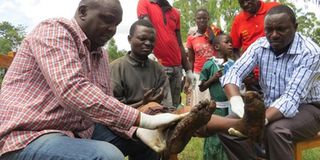Jiggers index: New report names counties worst hit by the menace

Ahadi Kenya CEO Stanley Kamau (left) with Head of News NTV Emmanuel Juma during a jigger eradication campaign in Budalang’i constituency last Saturday. PHOTO | LINET WAFULA |
What you need to know:
- Pesky fleas thrive in environment of poor hygiene and poverty
- Kiambu County, President Uhuru Kenyatta’s backyard, figures prominently in the study.
- Dr Stanley Kamau of Ahadi Kenya told Sunday Nation lack of political will has hampered the elimination of the parasite.
A policy paper prepared by Health ministry officials and a local non-governmental agency says more than three million Kenyans are infested with jiggers, most of them in counties that are home to leading politicians.
Kiambu County, President Uhuru Kenyatta’s backyard, figures prominently in the study.
Murang’a tops the list of shame, on which Kiambu, Kilifi, Nyeri, Kwale, Baringo, Busia, Kakamega, Siaya and Marsabit counties also appear, calling into question what the local leadership in the respective devolved units is doing to eradicate this arthropodic parasite associated with poverty and dirt.
Others are Bomet, Bungoma Elgeyo Marakwet Homa Bay and Vihiga.
Kiambu, Nyeri, Kirinyaga and Murang’a are among the richest counties in the country but also have the widest disparity in wealth.
Three of Kenya’s four presidents hail from either Kiambu or Nyeri.
Retired President Daniel Moi’s home turf of Baringo also figures on the blacklist. In spite of Mr Moi’s 24 years at the country’s helm, the county is still infested with jiggers (Tunga penetrans).
The home of founding President Jomo Kenyatta was in Kiambu as is that of President Uhuru Kenyatta, his son. Kenya’s third President Mwai Kibaki is from Othaya in Nyeri.
WORST AFFECTED
According to the paper, children and the elderly are among the worst affected with infections occurring in schools, homes and other public places.
Sunday Nation learnt that none of the counties affected have clear policies or programmes aimed at the eradication of jiggers. It would appear that most of the governors of the affected counties do not see jiggers as an issue that requires their immediate attention even though it is estimated that as many as 10 per cent of the children infected drop out of school.
The jigger, also known as the chigoe flea, sand flea, funza, ndutu or dudu, originated in Central and South America. The female bores into extremities of mumans and animals, laying its eggs that cause toes––and occasionally fingers––to swell up and becime infected.
Public Health Director Kepha Ombacho says the ministry has prepared a plan to help control the jiggers’ spread.
“I would like to recommend this policy guideline to all partners and stakeholders in the country. It provides useful information on how to prevent, control and eventually eliminate jiggers in the country using the most effective, efficient and affordable methods,” he said.
The policy that is set to be gazetted soon entails government funds being allocated towards fighting jiggers, a departure from the current practice where action is undertaken mainly by well-wishers.
Dr Ombacho acknowledged the school hours lost because infected children are not able to walk, decreased agricultural productivity of infested adults and the loss of social capital due to stigma associated with the problem.
LACK OF POLITICAL WILL
Dr Stanley Kamau of Ahadi Kenya told Sunday Nation lack of political will has hampered the elimination of the parasite.
He said at one point, he was accused by some politicians from Nyeri and Kiambu of seeking to embarrass the President through his efforts to fight the parasite.
“The politicians have always viewed me with contempt; some thought I was preparing for an elective office by exposing their failures. But it is the support I got from retired President Mwai Kibaki that became a turning point because those in government started giving the initiative some attention.
“In Kiambu for instance, there were those who argued that I was projecting the President in bad light, but the moment First Lady Margaret Kenyatta threw her weight behind us, they changed their minds and are now supportive,” he said.
Dr Kamau said when they launched the anti-jigger campaing seven years ago in Murang’a they hadn’t realisedl the scope of the problem.
“After we visited the first four homes in Murang’a, we got overwhelming calls from various parts of the country affected by jiggers. This is a national issue and not just confined to certain parts of the country,” he said.





